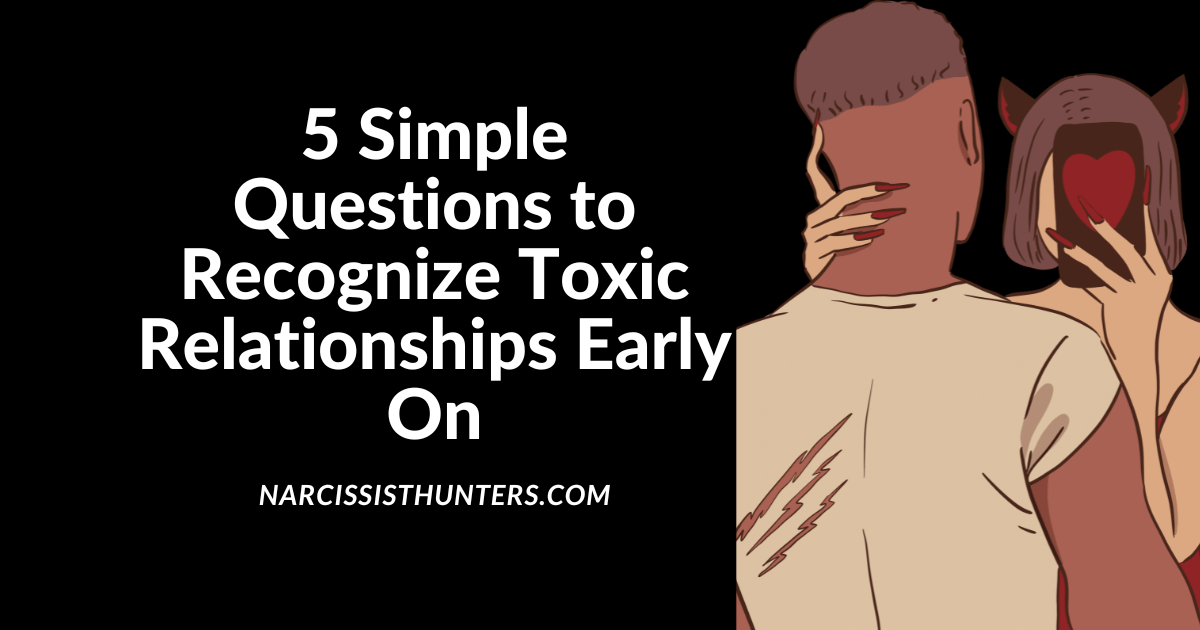Toxic relationships can be like a stealthy predator, slowly chipping away at your emotional wellbeing. But what if you could identify them with just five simple questions? Discover the power of recognizing toxic relationships and how to protect yourself.
Not all relationships are healthy and positive. Toxic relationships are those that cause us harm and damage our well-being. These relationships can come in various forms, including toxic romantic relationships , toxic family relationships, friendships, and work relationships.
Human beings are social creatures, and relationships are an essential aspect of our lives. Healthy relationships can bring us love, support, happiness, and fulfillment. They can help us grow, develop, and achieve our goals.
Strong relationships are based on mutual trust, respect, and communication. In short, healthy relationships can positively impact our mental, emotional, and physical well-being.
Toxic relationships are surprisingly common and can have a significant impact on our lives. According to research, 80% of Americans have experienced emotional abuse in toxic relationships.
The purpose of this article is to help you recognize toxic relationships and take steps to protect yourself. We will explore five simple questions that can help you evaluate the health of your relationships. These questions will help you identify toxic patterns, set boundaries, and make informed decisions about your relationships.
So, let’s dive into the five questions that can help you recognize toxic relationships.
Question 1: Do you feel drained or exhausted after spending time with this person?

This question is asking whether you feel mentally or physically exhausted after spending time with a particular person. It’s normal to feel tired after a long day or a busy event, but if you feel consistently drained or depleted after spending time with someone, it could be a sign of toxic relationships.
Toxic people can be emotionally draining. They may take up all of your energy and leave you feeling exhausted, even after short interactions. They might be negative, demanding, or critical, leaving you feeling deflated or overwhelmed.
Over time, consistently feeling drained or exhausted after spending time with someone can have a significant impact on your mental and emotional health.
Examples
Some examples of behaviors that can leave you feeling drained or exhausted include:
- Constantly complaining or being negative
- Requiring a lot of attention or support from you
- Criticizing or judging you frequently
- Guilt-tripping or manipulating you
- Being emotionally unavailable or distant
Ways to protect yourself From this type of toxic relationships
To protect yourself from feeling drained or exhausted after spending time with someone, consider setting boundaries.
You might limit the amount of time you spend with the person or try to meet in neutral, low-energy environments. It’s also important to prioritize self-care and give yourself time to recharge after interactions with a toxic person.
Finally, consider whether the relationship is worth continuing or whether it’s time to distance yourself for your own well-being.
Question 2: Do you feel like you’re constantly walking on eggshells around this person?

This question is asking whether you feel like you have to be careful about what you say or do around a particular person. It’s like you’re walking on eggshells, afraid that anything you say or do might trigger a negative reaction.
If you feel like you have to be constantly cautious and watch your words around someone, it could be a sign of a toxic relationship.
In a healthy relationship, you should feel comfortable being yourself and expressing your thoughts and feelings without fear of judgment or negative consequences.
Feeling like you have to be careful all the time is a sign that something is wrong. It could indicate that the other person is overly critical, easily angered, or abusive.
Examples
Some examples of behaviors that might make you feel like you’re walking on eggshells include:
- Criticizing or belittling you for your opinions or feelings
- Reacting negatively or angrily to your words or actions
- Giving you the silent treatment or withholding affection or attention as a form of punishment
- Being unpredictable in their reactions, making it hard to know how they will respond
Ways to protect yourself
To protect yourself from feeling like you’re walking on eggshells, it’s important to establish clear boundaries and communicate your needs. If the other person is willing to work on the relationship, you might try talking openly about how their behavior makes you feel and setting clear expectations for how you want to be treated.
However, if the person is unwilling to change or if their behavior is abusive, it may be necessary to end the relationship altogether. Remember, you deserve to be treated with respect and kindness in all your relationships.
Question 3: Do they make you feel bad about yourself or put you down?

This question is asking whether the person in question makes you feel worse about yourself after spending time with them. If they consistently criticize, insult, or put you down, it could be a sign of a toxic relationship.
A healthy relationship should lift you up and make you feel good about yourself. If someone consistently puts you down or makes you feel bad about yourself, it can be emotionally damaging and negatively impact your self-esteem. Over time, this kind of behavior can lead to feelings of worthlessness and self-doubt.
Examples
Some examples of behavior that could make you feel bad about yourself include:
- Criticizing your appearance, intelligence, or abilities
- Insulting or belittling you in front of others
- Comparing you unfavorably to other people
- Using your insecurities or vulnerabilities against you
- Blaming you for their own problems or shortcomings
Ways to protect yourself
If someone is consistently making you feel bad about yourself, it’s important to set boundaries and communicate your needs. You might try telling the person how their behavior makes you feel and asking them to stop.
If the person is unwilling to change or continues to put you down, it may be necessary to end the relationship. Remember, you deserve to be treated with kindness and respect, and you should never have to tolerate someone who consistently makes you feel bad about yourself.
Question 4: Do they ignore your boundaries or make you feel uncomfortable?

This question is asking whether the person in question respects your boundaries and makes you feel comfortable. If they consistently ignore your boundaries or make you feel uncomfortable, it could be a sign of a toxic relationship.
Boundaries are important in any relationship because they help establish mutual respect and trust. If someone consistently ignores your boundaries or makes you feel uncomfortable, it can be emotionally damaging and lead to feelings of insecurity and distrust.
Examples
Some examples of behavior that could make you feel uncomfortable or ignore your boundaries include:
- Pressuring you into doing things you’re not comfortable with
- Ignoring your requests for personal space or alone time
- Refusing to listen to your opinions or needs
- Invading your privacy or personal space without permission
- Disregarding your safety concerns or boundaries related to physical contact
Ways to protect yourself
If someone is consistently ignoring your boundaries or making you feel uncomfortable, it’s important to communicate your needs and establish clear boundaries. You might try telling the person how their behavior makes you feel and asking them to respect your boundaries.
If the person is unwilling to change or continues to disregard your boundaries, it may be necessary to end the relationship. Remember, you have the right to set boundaries and feel safe and comfortable in your relationships.
Question 5: Do you feel like you’re always giving more than you’re receiving?

This question is asking whether the person in question is taking more from the relationship than they are giving. If you feel like you are consistently putting in more effort, energy, or resources than the other person, it could be a sign of a toxic relationships.
A healthy relationship should be a two-way street, with both people putting in effort to maintain the relationship. If one person is consistently taking more than they are giving, it can lead to feelings of resentment, frustration, and burnout. Over time, this kind of dynamic can be emotionally draining and negatively impact your mental health.
Examples
Some examples of behavior that could make you feel like you’re always giving more include:
- Being the only one to initiate plans or communication
- Always accommodating the other person’s needs or schedule
- Feeling like you’re always the one making compromises or sacrifices
- Putting in more effort to resolve conflicts or issues in the relationship
- Feeling like the other person doesn’t value or appreciate your contributions to the relationship
Ways to protect yourself
If you feel like you’re always giving more than you’re receiving in a relationship, it’s important to communicate your needs and establish clear boundaries. You might try telling the person how their behavior makes you feel and asking them to put in more effort to maintain the relationship.
If the person is unwilling to change or continues to take more than they give, it may be necessary to reevaluate the relationship and consider ending it. Remember, you deserve to be in a relationship where your contributions are valued and appreciated.
Recap of the questions to recognize Toxic Relationships
In this article, we’ve discussed five simple questions that can help you recognize toxic relationships. These questions are:
- Do you feel drained or exhausted after spending time with this person?
- Do you feel like you’re constantly walking on eggshells around this person?
- Do they make you feel bad about yourself or put you down?
- Do they ignore your boundaries or make you feel uncomfortable?
- Do you feel like you’re always giving more than you’re receiving?
By asking these questions, you can begin to identify unhealthy patterns in your relationships and take steps to protect your mental health and well-being.
Final thoughts
I encourage you to prioritize healthy relationships in your life by setting clear boundaries, communicating your needs and expectations, and surrounding yourself with people who uplift and support you.
Healthy relationships are essential to our emotional and physical health. While it’s normal to experience conflicts and challenges in any relationship, it’s important to recognize when a relationship has become toxic and take action to protect yourself.
